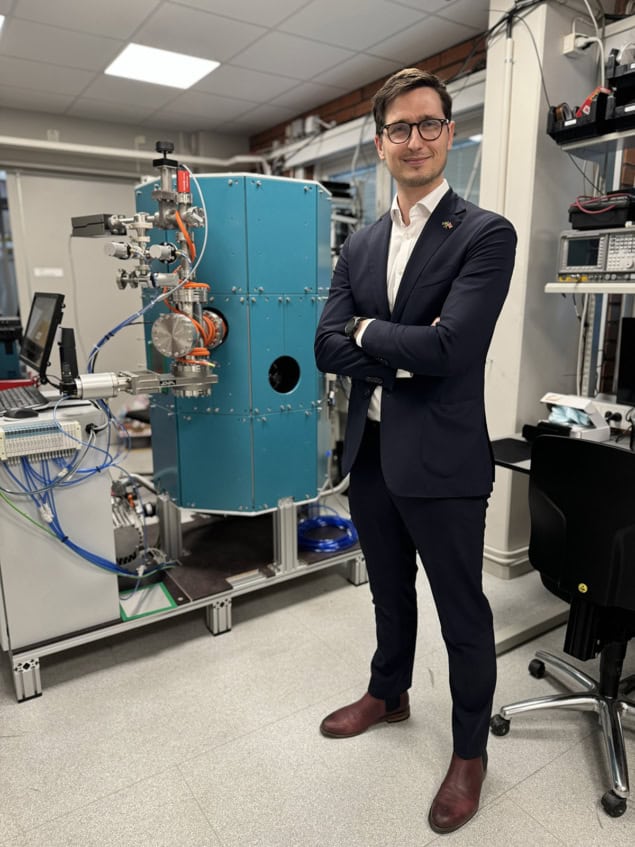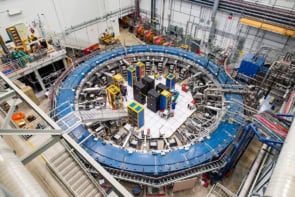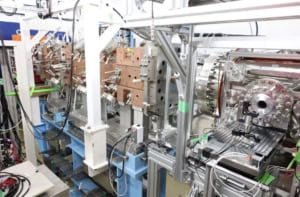Craig Jantzen is the first secretary and regional manager for the UK’s Science Innovation Network in the Nordic and Baltic regions. As a former nuclear scientist, he talks to Katherine Skipper about his varied career, how he learned to make mistakes, and why he thinks scientists can make great diplomats

When Craig Jantzen was a PhD student at the University of Manchester in the UK, he used to go to politics and economics lectures alongside his research into nuclear materials. Jantzen is fascinated by all things nuclear, but he also saw the PhD as an opportunity to broaden his horizons beyond science. “You’re not drained from doing a nine-to-five job every day, and you’re around people that want to learn constantly,” he recalls.
Jantzen’s PhD, which he finished in 2017, involved investigating materials for next-generation nuclear reactors. It has been proposed that molten chloride salts, which are excellent heat conductors, could be used instead of water as reactor coolants, but these salts are incredibly corrosive to metals. Jantzen was testing the corrosion of different metal alloys in molten chloride salts in order to identify optimal materials for these reactors. But he is now a diplomat working on science collaboration and policy for the UK government. Given his interest in politics, Jantzen’s job might not seem surprising, but he emphasizes that his career has “not been a straight line”.
Having worked in finance, energy and environmental policy as well as the UK government’s COVID-19 response, Jantzen is currently based in Stockholm as the first secretary and regional manager for the UK’s Science Innovation Network where he covers the Nordic and Baltic regions. The network aims to build collaboration, promote UK research and provide expertise to the government. He leads a team of trained scientists, many of whom have PhDs, using their research experience to address policy issues like AI and climate change.
Embracing change
Jantzen’s first experience of what it would be like to work as a diplomat was sparked by a chance encounter at a conference during his PhD. He attended a talk by a speaker who had worked at the International Atomic Energy Agency (IAEA), which promotes the safe use of nuclear technologies. Jantzen was particularly intrigued to hear the speaker talk about nuclear safeguards, and in his second year, he did a six-month internship at the IAEA in Vienna, working in the same team that had responded to the Fukushima Daiichi nuclear accident in 2011.
I realized I like talking about science a lot more than I enjoy doing science
After his PhD, Jantzen considered staying in academia, but decided that his skills would be of better use elsewhere: “I realized I like talking about science a lot more than I enjoy doing science”. As it turned out, Jantzen’s first job after his PhD was as a financial consultant for Capco in London. “I knew that I would learn a lot in that environment and that they give you a lot of responsibility”, he says, “and I felt that was a good compliment to academic research”. Indeed, he credits this experience with getting him over some of the imposter syndrome he had from his PhD. With an emphasis on meeting deadlines, he had to let go of perfectionism and admit when he didn’t know something, eventually realizing that this allowed him to learn much faster.
But after 18 months in finance, it was time for another change. Wanting to do something he’d find more fulfilling, Jantzen started applying for jobs in the UK government. However, his career in the civil service got off to a slightly bumpy start.
He had been offered a role working for the Department for Business, Energy & Industrial Strategy on the proposed Wylfa Newydd nuclear power station in north Wales. However, in January 2019 – less than a week before he was supposed to start – the project was suspended. Instead, Jantzen joined the Energy Strategy team in the same department where he worked on the UK’s plan to reach net-zero emissions by 2050. His research experience had given him “a nuclear energy lens”, but working with modellers and policy teams across technologies like carbon capture and offshore wind gave him a valuable crash-course in the wider energy landscape.
Far-flung ambition
Having previously enjoyed his stint overseas with the IAEA, Jantzen soon started looking for more international-facing roles. With the UK hosting the 2021 United Nations Climate Change Conference (COP26), he knew that international environmental affairs was something he wanted to be part of. In November 2019 Jantzen moved to the Government Office for Science where he worked on the development of the UK’s COP26 science strategy. He also volunteered for the Scientific Advisory Group for Emergencies (SAGE) secretariat during the COVID-19 pandemic, where he co-led the epidemiology policy team and prepared advice that was given to the government.
A science background…helps you do your job more effectively because you understand the technology, you’re not intimidated by it
As it happened, when the opportunity came to move overseas, it was to return to the IAEA on a secondment funded by the UK government. In this role, he advised the IAEA on climate change during COP26 and COP27 – which was held in Egypt in 2022. This gave him the experience he needed to apply for full-time jobs overseas, which is how he ended up in his current position.

Ask me anything: Cathy Foley – ‘I have lots of balls in the air on multiple projects’
Now Jantzen’s day could involve negotiating bilateral agreements, hosting an embassy reception, or running technology workshops. Jantzen believes his science background has been valuable to his career, saying “It helps you do your job more effectively because you understand the technology, you’re not intimidated by it”. As well as technical knowledge, scientists bring a diversity of thought that is valuable to a team, he believes.
Jantzen thinks his school and university-age self would be surprised at where his early interest in nuclear science has taken him: “I never imagined being a diplomat or working internationally.” He had to gradually build up experience before making the jump to a diplomatic role overseas, and his advice to others who are interested in switching from science to diplomacy is not to be deterred if it takes time, saying “I definitely saw stepping stones. I didn’t know exactly what opportunity was going to come up, but when I did, I was just ready for it.”



